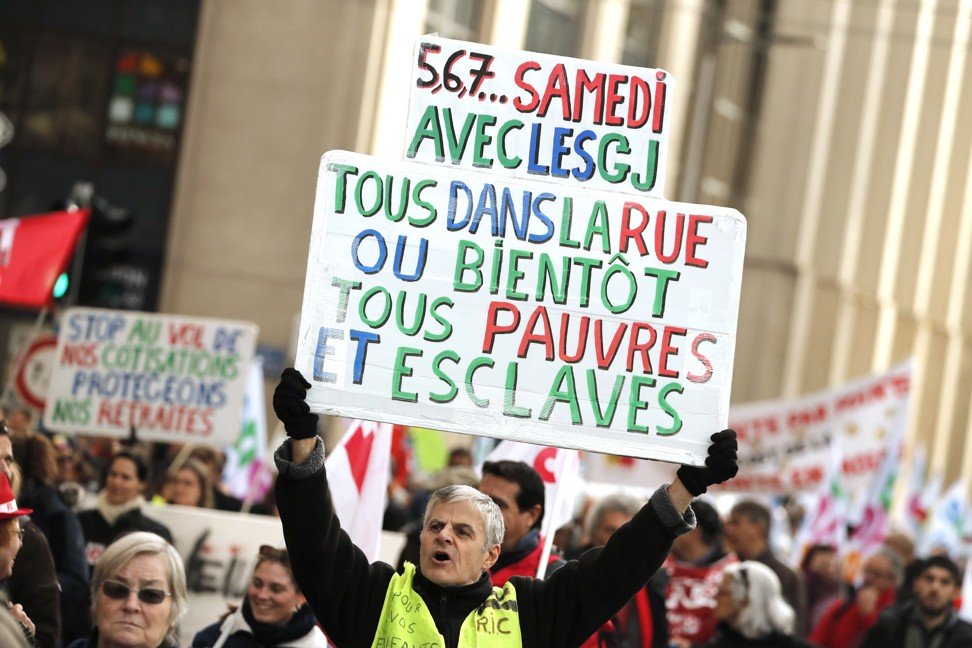www.aljazeerah.info
Opinion Editorials, January 2020
Archives
Mission & Name
Conflict Terminology
Editorials
Gaza Holocaust
Gulf War
Isdood
Islam
News
News Photos
Opinion Editorials
US Foreign Policy (Dr. El-Najjar's Articles)
www.aljazeerah.info
In 2020, Voters Everywhere Must Reject Policies that Cut Public Spending Only to Enrich the Wealthy By Isabel Ortiz SCMP, January 2, 2020 |
 |
 |
 |
| A protester in Montpellier, France, holds up a sign that reads “On Saturday with the Yellow Vests, all in the streets or soon all poor and slaves” during a demonstration against pension reform on December 12. Photo: EPA-EFE | Supporters of US President Donald Trump hold up placards at his campaign rally in Battle Creek, Michigan, on December 18. Trump’s “America first” agenda resonates with significant numbers of the US voting public. Photo: AP |
When the neoliberal policies of old failed us, it has been the far right that seized on the public discontent to make political gains. But the solutions they offer are broken, and voters must demand public investments that actually benefit people
The year 2019 ended with widespread demonstrations, rising inequality and a crisis of representation in many countries. The world is sleepwalking towards recession and a new crisis, while depleting the environment. Governments, and ultimately people, can reverse these alarming trends in 2020.
Sixty-one countries will have presidential or parliamentary elections in 2020. Many citizens want change, and they will choose new parties as a way to achieve this.
This is an important opportunity to redress the current situation, but many of the new emerging leaders are far-right demagogues who blame today’s problems on social welfare policies, migrants and the poor, while aiming to remove all remaining constraints on capital. As in Britain, many whom neoliberalism has harmed will vote for these politicians, making the world a more unequal and riskier place.
A lot will be decided in the US, still the world’s hegemonic power. How US citizens vote in the 2020 presidential election will have profound consequences for the rest of the planet’s citizens.
US President Donald Trump has already had a big impact on the world, eroding multilateral institutions, trade agreements and global initiatives as part of his “America first” agenda. Despite the populist rhetoric, Americans in the main have benefited little. Trump’s large tax cuts for the wealthy, cuts to health care access, and increases in the US defence budget are regressive, resulting in increased inequality.
Yet the right continues to win votes, partly because it is becoming ever more radical, offering out-of-the-box “unthinkable” policies – from building walls to exiting the European Union – that appeal to those who want change above all else.
Unless social democrats advance attractive progressive public policies in 2020, the radical right will continue to rise.
How we got to this point is not difficult to discern. Four decades of neoliberal policies have eroded living conditions in most countries.
Governments of both the left and the right have been pursuing supply-side policies focused on improving business competitiveness, which has meant lower wages, more “flexible” labour markets, lower corporate taxation and greater income inequality. Meanwhile, global demand has stagnated.
Governments have also pursued cuts in social expenditure and the privatisation of public services.
Thus, the average citizen has experienced a significant decline in welfare, and growth has remained slow, because neoliberal policies do not address the long-term structural causes of the problem: overproduction and excess capacity.
If the current course is not changed, austerity policies will continue spreading in 2020, cutting into pensions, wages, social programmes and labour protections. Absurdly, many governments are cutting social expenditure, but increasing military spending and supporting large corporations with public funds and limited regulation.
Austerity is not necessary. Even in the poorest countries, there are alternatives. The International Labour Organisation, United Nations Women, and Unicef report at least eight financing options to generate resources sustainably and avoid cuts to public services.
For example, countries can curb illicit financial flows, crack down on tax evasion, increase the progressivity of the tax system, reduce debt service by better managing debt, or adopt more accommodative macroeconomic frameworks. There have been many successful examples in recent times.
If governments were to opt out of austerity, we could see more countries successfully raising revenue for national development in 2020, increasing public investments that benefit people, and supporting real economic activity and human development, with a view towards generating decent employment and ensuring environmental sustainability.
In addition to improving financial regulation, these policies would help avert the danger of recession and the possible economic and financial crisis predicted by institutions such as the UN, JP Morgan and Moody’s.
Even if the world avoids economic calamity in 2020, environmental devastation will continue. Unless adequate policies are implemented, deforestation, overfishing, carbon emissions and waste generation are all expected to increase in absolute terms next year.
These are not just national issues. Global problems require global solutions and multilateralism needs to be strengthened, not weakened, to work together to form sustainable solutions to improve people’s lives.
Governments, and ultimately citizens, can improve the world in 2020. But if they continue obsessing about stock prices and quarterly earnings at the expense of a long-term vision, raising defence spending and cutting welfare, blaming migrants and the poor, while allowing the rich to become richer and the environment to be further damaged, it will be another long year of living dangerously.
Isabel Ortiz, director of the Global Social Justice Programme at the Initiative for Policy Dialogue at Columbia University, was director of the International Labour Organisation and Unicef, and a senior official at the UN and the Asian Development Bank. Copyright: Project Syndicate This article appeared in the South China Morning Post print edition as: 2020 must be the year that marks the end of austerity Advertisement Comments
***
Isabel Ortiz, director of the Global Social Justice Programme at the Initiative for Policy Dialogue at Columbia University, was director of the International Labour Organisation and Unicef, and a senior official at the UN and the Asian Development Bank.
***
Share the link of this article with your facebook friends
|
|
|
|
||
|
||||||


